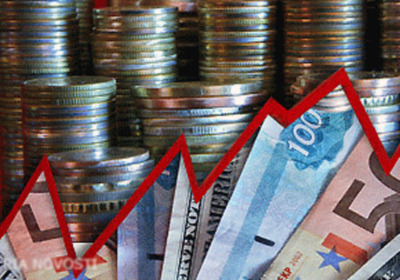Putin walks fiscal tightrope; deficits seen to 2020

(Bloomberg – bloomberg.com – ANDRE TARTAR AND OTT UMMELAS – May 7, 2016)
If the Russian government’s in-house forecaster is right that muted oil prices are here to stay, budget deficits will stretch to the end of this decade, according to a Bloomberg survey of analysts.
Under the Economy Ministry’s projection that oil will average $40 a barrel through 2019, the books won’t balance until 2020 or later, according to 23 of 28 analysts in the poll. Four of them expect revenue to match spending only after 2025. Authorities are seeking fiscal savings of one percentage point of gross domestic product each year to balance the budget by 2019, which a plurality of economists identified as the government’s best hope for boosting growth.
The challenge for President Vladimir Putin is to manage an era of thrift with the economy in pieces and elections looming this year and in 2018. A period of entrenched deficits that’s without precedent during Putin’s 16 years in power means the government would have to tread carefully to avoid busting the budget after oil’s collapse.
“While large scale fiscal and monetary stimulus is usually highly effective in reviving short-term economic activity, they won’t improve the long-term prospects of the Russian economy,” said Sergey Narkevich, an analyst at Promsvyazbank in Moscow. “On the contrary, with high probability their use will destabilize budget and financial systems down the road.”
To cover the gap, the Finance Ministry plans to transfer about 2 trillion rubles ($30 billion) in 2016 from the Reserve Fund, one of its two sovereign wealth coffers, after channeling 2.6 trillion rubles in 2015. The Reserve Fund stood at $45 billion at the end of April, while the National Wealth Fund amounts to $73.9 billion.
The budget, in surplus between 2000 and 2008, was for years a linchpin of economic stability in Russia, allowing the government to stockpile reserves and reduce debt to near 10 percent of GDP in 2015 from 90 percent in 1999.
Fiscal imbalances are now among the chief sources of uncertainty, with the central bank singling out the budget outlook as a risk for the economy and inflation.
“Given the presidential election in 2018, it will be difficult to go for substantial additional consolidation before this date,” said Andreas Schwabe, an economist at Raiffeisen Bank International AG in Vienna.
The government ran a deficit of 2.4 percent of GDP last year and wants to keep the shortfall to 3 percent in 2016 at an average oil price of $40 a barrel. The nation’s main export blend Urals averaged $33.93 in the first four months of the year. The government has delayed to the fall amending this year’s budget, which is still based on an average oil price of $50 a barrel.
Russia’s non-oil deficit, the shortfall excluding revenue from the energy industry, was at 11 percent in the first half of last year, the widest in a decade. That’s above a level Finance Minister Anton Siluanov has called “critical.”
Oil and natural gas account for about a third of Russia’s budget revenue and almost 60 percent of its exports. As crude rebounded, the ruble has gained about 12 percent against the dollar this year after a 20 percent loss in 2015.
Under the Economy Ministry’s forecast for oil at $40 through 2019, GDP will return to growth next year after shrinking 0.2 percent in 2016 and 3.7 percent last year.
Looser fiscal policy is among the least effective ways to jump-start growth in the medium term to more than 1.5 percent, according to analysts surveyed by Bloomberg. Economic reforms were ranked first, followed by improved relations with the West and the removal of sanctions.
Nothing will benefit the economy as much as the government shutting off the taps, according to the poll. Forty-one percent of respondents said hurrying up with budget consolidation is the single biggest step it should take to boost growth. That was followed by 17 percent supporting a sell-off of big state companies.
“The possibility of a medium-term fiscal stimulus will be limited,” said Bence Andras, an economist at OGResearch in Budapest. “In addition, although we assume that Western sanctions will be lifted in 2017, economic ties will not be normalized immediately, so the sanctions will have a lingering medium-term effect on Russia’s potential growth even after their cancellation.”
Article ©2016 Bloomberg L.P. All Rights Reserved. Article also appeared at bloomberg.com/news/articles/2016-05-05/putin-walks-fiscal-tightrope-as-no-end-to-deficits-seen-to-2020
